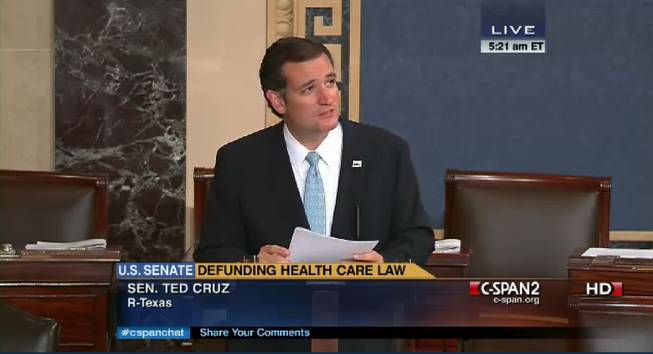
CSPAN / AP
In an image made from the C-Span broadcast, Sen. Ted Cruz continues to speak on the floor of the U.S. Senate at 5:21 a.m. EDT Wednesday Sept. 25, 2013. Since Tuesday afternoon, Cruz — with occasional remarks by Sen. Mike Lee, R-Utah, and other GOP conservatives — has controlled the Senate floor and railed against Obamacare. By 5 a.m. EDT Wednesday, Cruz and his allies had spoken for more than 14 hours, the eighth longest since precise record-keeping began in 1900.
Thursday, Sept. 26, 2013 | 7 p.m.
In the Senate, the struggle to avoid a government shutdown is no longer really between Republicans and Democrats.
It is between Senate Majority Leader Harry Reid and two Republicans: Sens. Ted Cruz and Mike Lee.
For the past few days, Reid, Cruz and Lee have been engaging in a contest so dominated by procedure that even members of Congress’ heads are spinning.
On one side, there’s Reid, the established master of Senate procedure, who has set up a series of votes that will eventually allow a simple majority of lawmakers — assume they’ll all be Democrats — to pass a temporary budget measure that leaves Obamacare funding intact.
On the other side are Cruz and Lee, who have managed to turn the Senate into a forum to spotlight themselves as Obamacare purists this week, dedicated to defunding the health care law even in the face of a government shutdown.
First, the two engaged in a 21-hour overnight “filibuster” (we’ll get to that in a minute), in which Cruz spent considerable time warning not just Democrats, but also Republicans that their procedural votes on the budget would carry consequences.
“If you vote to give Harry Reid the power to fund Obamacare on a straight, partisan, 51-vote threshold, then you are willing to fund Obamacare,” Cruz said. “And I’ll tell you this: Your constituents are going to know about it.”
“Pick a side,” he continued. “You don’t get it both ways.”
Senate procedure is a sticky and seemingly nonsensical thing to those who aren’t immersed in it on a daily basis. But basically speaking, there are two kinds of votes: Straight majority votes, which it takes 51 one votes to win, and cloture votes, which need 60 supporters to avoid a procedural filibuster.
Which vote gets used is often a matter of how much the minority hates the legislation — and simple math. There are 54 Democrats in the Senate, enough to clear a 51-vote majority on most issues. On a cloture vote, however, the 46 Republicans have more than enough members to keep a bill from passing.
Cloture has a few quirks to it, though. First, it comes with a time limit: 30 hours of debate, from the point when Reid files a motion to start the clock. Cruz’s Tuesday-to-Wednesday talkathon actually took place during that window, which is why some object to calling it a filibuster.
More importantly though, cloture votes can’t keep going forever. You can use them to open debate, and to end debate. Once you do though, the final vote on a bill is always decided by simple up-or-down majority.
And that’s what lies at the heart of Cruz’s challenge to his fellow Republicans: He doesn’t want them enabling any simple-majority votes on the budget and funding Obamacare.
Only problem is, Cruz is losing his audience.
Republicans are, by and large, kind of fine with the plan Reid has laid out. It gives them a chance to vote for the House-passed continuing resolution, by voting for cloture. Then, they get a chance to vote against the Senate version, by voting against the amended bill.
Why aren't they putting up a fiercer fight? Because while Republicans hate Obamacare, they’re really not into the idea of steering the country straight into a government shutdown to defund something many have already acknowledged is the law of the land.
Plus, Cruz has presented a message that, while procedurally hair-splittingly specific, is coming across as too muddled for much of the Republican caucus.
On Wednesday, Cruz promptly voted in favor of a cloture motion right after his 21-hour filibuster railing against them — a move he explained did not actually contradict his position because he only was warning against a second cloture vote, coming up Friday.
Leading Republicans, however, were not amused.
“I don’t think we’ve had a 21-hour filibuster and then the person carrying out the filibuster voted for the issue they were filibustering,” Sen. Bob Corker, R-Tenn., said Thursday.
They were even less taken with Cruz and Lee's efforts Thursday night to forestall a final vote on the Senate budget until Friday, so that more viewers could watch the proceedings. By late Thursday, leading Republicans were openly disowning Cruz and Lee.
“It’s not the Republican side that’s asking to stall,” Corker continued. “We only have two Republican senators who are asking to push this off.”
Reid ultimately scheduled the budget votes for Friday at 12:30 EST.


Join the Discussion:
Check this out for a full explanation of our conversion to the LiveFyre commenting system and instructions on how to sign up for an account.
Full comments policy